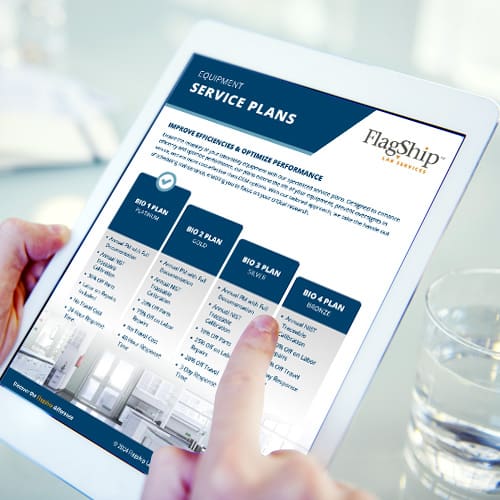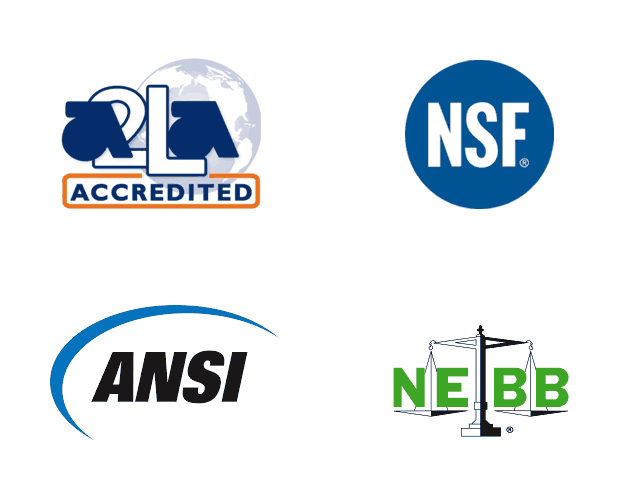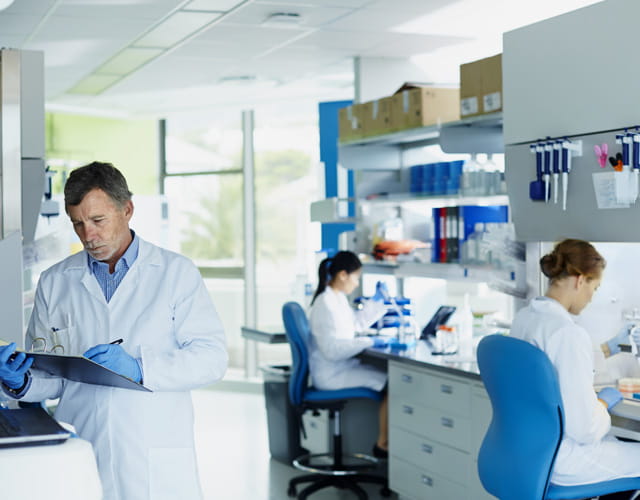Lab Equipment Services
Comprehensive Equipment Services for Optimal Performance
Flagship Lab Services provides comprehensive equipment services to guarantee the prolonged functionality and reliability of your assets. We specialize in everything from calibration and validation to preventive maintenance and repair and testing and certification.
Equipment We Service
Our team has the skills and certifications necessary to perform critical preventive maintenance, minimizing downtime and ensuring the smooth operation of your lab.
We service a wide range of equipment and instruments, including:
- Autoclaves
- Balances: Micro, Standard, & Scales
- Baths: Water & Dry
- BSCs & Fume Hoods
- Centrifuges: GP, Refrigerated, & Ultra
- Cold Storage: +4°C, -20°C, -80°C, -140°C, & LN2/Cryo
- Data Loggers, Chart Recorders, & HPLCs
- Incubators: GP, CO2, & Shaking
- Pipettes
- Rotators, Shakers, & Mixers
- Spectrophotometers
- Thermal Cyclers/PCR Machines/ DNA Amplifiers
- Water Systems
- Thermometers & Weights
- And More!
Preventive Maintenance for Your Critical Equipment
Similar to the maintenance schedule for your vehicle, implementing a PM plan for your lab equipment prolongs the life of your assets by up to 40% and ensures they operate at peak efficiency, maximizing equipment up-time for your end-users. PMs for equipment involve regularly scheduled inspections, servicing, and repairs to prevent potential equipment failures. Unlike reactive maintenance, which addresses issues after they occur and can lead to expensive repair costs, preventive maintenance proactively addresses potential failure points and can include inspections, cleaning, lubrication, consumable parts replacement, and more. Flagship Lab Services preventive maintenance routines typically follow manufacturer specifications but can be tailored to your lab's specific needs.
After your PM, equipment should be calibrated to ensure it's within usage specifications. Read on to understand how calibrations can maximize your lab's efficiency and workflows.
Calibration and Validation Services to Keep Your Lab on Track
Our calibration and validation services ensure that your lab equipment operates at peak efficiency, preventing costly downtime and project delays. We offer accurate, timely, and fully documented calibration services with flexible options including mail-in, pickup, delivery, and on-site support. Additionally, our validation services cover all your IOPQ needs, from protocol development to execution, ensuring your equipment meets the highest performance standards.
Maximize Efficiency with Our Service Agreement Plans
Our service agreement plans are designed to streamline the management of your preventive maintenance and calibration schedule and minimize unnecessary interruptions. A variety of discounts are available when combining PMs, calibrations, and repair solutions.
Customizable solutions are available for Life Sciences facilities and critical environments. Contact us to find out more.


Answering Your FAQs
We provide cutting-edge equipment services across the entire United States, including major Life Sciences hubs such as California, Washington, Colorado, Texas, North Carolina, and Massachusetts.
We test and certify a variety of lab equipment, including biological safety cabinets, chemical fume hoods, cleanrooms, HEPA/ULPA filters, isolators, and more.
Yes, we can assist in determining cGMP requirements for your facility, equipment, production and process controls, record keeping procedures, and other areas.
Yes, we provide comprehensive electrical safety checks as part of our preventive maintenance services. These checks ensure your equipment meets safety standards, reducing risks to both equipment and personnel.
Absolutely! Our experienced technicians are equipped to handle a wide range of lab equipment repairs. We offer both on-site and off-site repair services to minimize downtime and get your equipment back in working order quickly.
Yes, we are experienced in servicing lab equipment in clean rooms and controlled environments. Our technicians follow strict protocols to maintain the integrity of your clean room, ensuring compliance with all relevant standards during equipment maintenance and repair.

